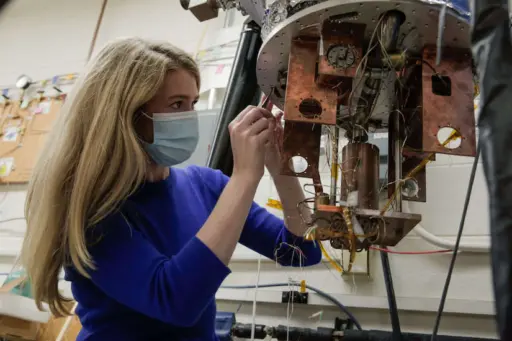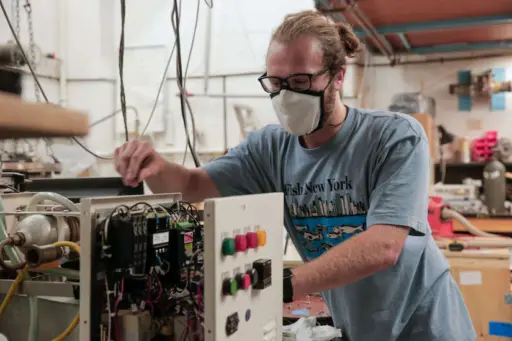University of Wisconsin-Madison mechanical engineering graduate students Chloe Gunderson and Logan Kossel have received prestigious NASA fellowships to support their cryogenics research.
The 2020 NASA Space Technology Graduate Research Opportunities (NSTGRO) fellowship is awarded to outstanding students who show significant potential to contribute to NASA’s goal of creating innovative new space technologies for our nation’s science, exploration and economic future. The award provides funding up to $80,000 per year for a monthly stipend, tuition and fees, conference travel, and equipment to conduct research.
 Chloe Gunderson works on research in the lab. Photo: Renee Meiller.
Chloe Gunderson works on research in the lab. Photo: Renee Meiller.
“This is NASA’s most prestigious award for graduate students,” says Mechanical Engineering Associate Professor Franklin Miller, who advises Gunderson. “While universities will sometimes receive a few of these awards at a time, it’s really exceptional to have two awards in the same year for students in the same research group.”
Miller says that UW-Madison’s strength in cryogenic engineering has made it NASA’s go-to place for recruiting top talent in the field. In fact, in recent years NASA has hired eight graduates from the cryogenics research group.
“NASA keeps returning to hire our PhD and master’s graduates, and our students are selected for internships at NASA and awarded these top fellowships, which speaks to the excellence of the cryogenics group here,” Miller says.
This is the second time NASA has awarded Gunderson the highly competitive fellowship. Her first two-year fellowship, which ended in August 2020, supported her master’s degree research at UW-Madison. Now, the new 2020 fellowship is enabling her to pursue her PhD and continue her research.
“Though these fellowships represent a significant advancement toward my dream career, these opportunities have been especially meaningful to me because I have grown up admiring NASA’s incredible feats of engineering,” Gunderson says. “It has been a very special experience to watch the launches now as a very small part of this huge team. Hopefully, one day I will be able to watch something that I have been directly involved with fly in space. I will forever be thankful for the opportunity to be a NASA fellow.”
In her research, Gunderson is working to develop a novel cryogenic refrigeration system that can more efficiently cool space astrophysics detectors down to extremely low temperatures—colder than 1 Kelvin, or about -458 degrees Fahrenheit. NASA uses these detectors in astrophysics missions to observe low-energy photons. Through these observations, NASA has been able to find terrestrial planets, examine cosmic background radiation, map gravitational fields and investigate black holes, among other things.
To do their job, these detectors need to be kept at cryogenic temperatures—and the colder the better. “Colder temperatures increase the sensitivity of these instruments and allow for better energy resolution, enabling the investigation of many important cosmological questions,” Gunderson says.
Gunderson says her engineering education at UW-Madison has been instrumental in her success. “The core engineering classes here are phenomenal and have built a strong foundation for me,” she says. “And because UW-Madison’s cryogenics lab is very well-developed, I have all the resources I need to complete the research proposed in my fellowship—a luxury I would not have at many other universities and an important factor in my application.”
In addition, Gunderson says the support and encouragement from her professors and the opportunity to engage in research as an undergraduate at UW-Madison had a significant impact on her educational path.
Impressed by Gunderson’s outstanding performance as a then-undergraduate student in his class, Miller offered her a research assistant role in his cryogenics lab. That research experience led to Gunderson applying for her first NASA fellowship and staying at UW-Madison to pursue graduate studies.
“Chloe is at the very top of the students I’ve been able to work with throughout my career,” Miller says. “She has the ability to grasp complex theoretical concepts very quickly and has excellent experimental capabilities. Chloe has been able to develop numerical system models, build hardware in the lab and test these systems. With this combination of strengths, she really stands out as a remarkable student and a researcher with a very bright future.”
Undergrad research experience gives Kossel an edge
 Logan Kossel sets up equipment in the lab. Photo: Renee Meiller.
Logan Kossel sets up equipment in the lab. Photo: Renee Meiller.
For Logan Kossel, an undergraduate research experience at UW-Madison also paved the way to earning a NASA NSTGRO fellowship.
After taking a thermodynamics course with Mechanical Engineering Professor John Pfotenhauer during a summer study abroad program in Hangzhou, China, in 2018, Kossel reached out to Pfotenhauer to join his lab as an undergraduate research assistant.
“My experience working in the cryogenic engineering lab with Professor Pfotenhauer inspired me to pursue this NASA fellowship, and it has provided me with the skills and knowledge necessary to be successful in this graduate research project,” Kossel says. “Working in a lab environment gave me valuable hands-on experience with designing experiments and using equipment, and it allowed me to apply what I was learning in class to solve important problems.”
Kossel earned his mechanical engineering bachelor’s degree in spring 2020. His four-year NASA fellowship will support his PhD studies, which he began in September 2020.
“Receiving this fellowship is life-changing and will help me enter the realm of space research, which I have always been fascinated with,” he says. “I am very excited for this opportunity, and I hope I can contribute to NASA’s goal of exploring the universe throughout my graduate studies at UW-Madison and in my career.”
The NASA fellowship is supporting Kossel’s research on low-temperature pulsating heat pipes, which are devices that can be used to transfer thermal energy from one point to another with high efficiency and at low temperatures (down to around -450F).
He aims to characterize the performance of pulsating heat pipes based on their length and then determine how long they can be before their performance decreases. This is important because many space systems must be kept at low temperatures to work correctly, and pulsating heat pipes could potentially be used to remove unwanted heat.
For example, this technology could provide a better way to keep large containers of liquid fuel cool aboard a spacecraft, allowing the fuel to be used on a return trip from Mars. “Long pulsating heat pipes could reach many points along the containers’ surface to provide evenly distributed cooling,” Kossel says. “In addition, pulsating heat pipes weigh significantly less than other technologies used to redistribute heat, which is important for space technology.”
Pfotenhauer says Kossel is one of the most impressive undergraduate students he has worked with over three decades of teaching. “Logan is highly driven, creative and very quick at grasping complex ideas,” Pfotenhauer says. “It has been a pleasure mentoring him and I’m excited to see the great things he will accomplish in his PhD studies.”